- Home
- Bonnye Matthews
Ki'ti's Story, 75,000 BC Page 6
Ki'ti's Story, 75,000 BC Read online
Page 6
In the men’s circle, Grypchon-na said, “There is another solution. They could stay here. There is much room here. Cave Sumbrel could become the meat preparation area. We could do all the small butchering and smoking there. Meat that has been fully smoked could then be brought here for storage. We could have two hunters guard at night over there or we could devise a way to close the cave off during the night.”
The men were silent. Grypchon-na had presented a novel possibility. Each had to run the idea through his mind web. Ermi, Shmyukuk’s husband said, “These Others have a different social situation. They have a chief. The speaker must be the chief. He can tell anyone to do whatever he wants and they have to obey him. Here we are all equal.”
“You are wise, Ermi.” Wamumur said. “We need to set conditions on their coming here and the first is that they lose the chief title and adopt our way of all being equal, at least until they choose to leave.”
Slamika, who almost never spoke asked, “To keep our stories true, we need to use only our language. What will we do with them at story time?”
That was met with silence throughout the cave. Finally, Wamumur said, “You have thought well. Yes, we must keep our own language. We don’t want to pick up strange words to add to our language. We will deal with what to do with them at story time later. They could go to the lower rooms, but if they join us and intend to stay, then they will have to hear the stories. That is a condition that will form later. Probably by that time, they won’t follow the stories that well anyway.”
Hahami-na said, “I suggest that we invite them here now. We tell them we will use their cave for the meat preparation, but we tell them that the offer to stay here depends on how we get along. They must accept equality and adopt our ways while here. They will have to use our language. They can decide whether to join us at least temporarily here while they eat. If they choose to join us, they can then go back and get their things. If they need help, we can help. Also the season of cold days will come. We need much food to make it through. Then we need to go north to find land that is free of ash where animals walk the land. That is all I have to say.”
All members of the group did a strong palm strike.
The Others appeared over the hill. Manak touched palm to palm the hand of Abiedelai as it was offered to him open and fingers up. Then he turned and began to lead the Others to the cave. As they neared, the dogs began to bark and walk on stiff legs with hackles raised. There was silence in the cave except for Ki’ti and Minagle who tried to calm the dogs.
The Others were shown to a part of the cave between the cooking area and the sleeping area. It was the greater gathering spot. Quickly, food was distributed. The women of the People tried to distribute it by age, first to the elders and then to the younger Others. Chief Abiedelai urged his group not to eat too fast.
The women remained where they had eaten, afraid even of offering to help clean up. The men gathered near the door, with the dogs becoming disquieted again. Minagle quieted them. There were about twenty dogs, so they were something to reckon with.
The men of the Others were wary of the dogs. They had never had dogs, so they did not understand them at all. To the Others, these animals were wolves. Each of the Others tried to situate himself as far from the dogs as possible. The People recognized that and placed themselves carefully between the dogs and Others as a shield.
Chief Abiedelai spoke, “We are grateful for the food. It was well prepared and tasted good. You are good People.”
The men of the People lowered their heads. The Others seemed to understand the gesture.
Wamumur spoke, “We have decided to offer to let you stay here temporarily. We would use your cave for meat preparation and then store it here. Your cave has neither the water resources nor the space that this one has. You would be required to help us recover and prepare meat for storage and do the chores that are involved in living. We are unwilling to have two ways of being People. You would have to give up your Chief and live as all equal People while you are here. Our strength is in our working all for the good of all. You will have to learn to use our language, not your own. The season of cold days comes. We must gather much to make it through. When the season of new leaves comes, we will leave this place for land in the north free of ash. That is our plan. We are not willing to change.” Chief Abiedelai translated.
The Others looked at their Chief. To the People, Chief Abiedelai said, “Obviously, you have had success, while we have failed. It would be good for us all to join. I have no difficulty trying a different arrangement in the way we interact. We may learn from you that your way is better. We may prefer our own. We have to determine over time if we should remain or leave. Until then, we will totally adopt your ways, but you’ll need to let us know clearly what they are. Let us know if we are in error. If we separate after the season of cold days, we will go east.” Chief Abiedelai translated for his own listeners.
The people of Chief Abiedelai looked furtively at each other. They had eaten and were grateful, but it sounded like their Chief had been weakened by the food. They had understood him to say they had to learn to use another language. That seemed outrageous. It was particularly outrageous that they had to learn the language of People they considered inferior. But the Chief was the Chief.
“Then your men can go gather your things. Do you need help from our hunters?” Gruid-na asked.
The response was affirmative. Five of the hunters of the People donned their booted garments and prepared to help.
The People and the Others had heard the men. A few of the women of the People began to show the women of the Others where would be a good place for their sleeping mats. The women looked terribly tired and there was great sympathy for the Others who appeared so worn down.
Ki’ti was deeply thoughtful over what was happening. The muscles of her face made a vertical line between her eyebrows. She had already gone through her mind web with the stories and could find nothing that even came close to this experience, except Maknu-na and Rimlad. She was guessing that this would be a new story for their history. She looked up and one of the younger dogs had left the place where it was supposed to stay. It had tried to be unobtrusive and had found her and put its body as close to hers as possible. Its yellow brown eyes scanned hers carefully.
“You can stay here,” Ki’ti said as she stroked the dog. “It is the Winds of Change, little one,” she said, trying to reassure the dog and herself. The dog licked her and she found that comforting.
Minagle was very curious. Domur had whispered that the Others looked a little like her. Minagle couldn’t keep her eyes off them. She noticed that there were just a few of the Others that appeared to be her age. Minagle walked over to where the Others were sitting and knelt in front of Meeka, who was twelve. Meeka was terribly thin. Her black hair was matted and her face was streaked with dirt. Meeka was frightened but tried not to show it. Minagle pointed to herself and said, “Minagle.” Meeka had no clue what to do. Minagle tried again, and the girl looked at her confused. Minagle tried again. Suddenly, the attempt was spotted by Chief Abiedelai and he said in the language of the Others, “Meeka, her name is Minagle. Tell her your name and point to yourself.” The young girl did it. Minagle smiled and Meeka smiled, too. Minagle offered her hand and stood. Meeka stood. Minagle gently took her hand and led her to Domur. Domur stood. Minagle pointed to Domur and said, “Domur.” Meeka said, “Domur.” Minagle pointed to Meeka and said, “Meeka.” Domur smiled and said, “Meeka.” The friendship was making a new threesome. Minagle led both girls to the gourds. Domur picked up an oil light and lit the wick. The three girls picked up as many gourds as possible and headed to the water. Minagle’s effort was observed by the other women and it sparked an interaction of name exchanging and learning and preparing the newcomers to help clean up from the meal. The Others were willing to help but seemed to wait for someone to tell them what to do.
Meanwhile, Blanagah was beside herself. She tried not to fret too much but could no
t understand the absence of Reemast. She rocked back and forth while her arms cradled her bent legs. Any other day, she’d have been admonished for not contributing. She went to Enut and asked if she was well.
“I feel a little better. Thank you.” Enut truthfully did not feel better, nor did she wish to lie to Blanagah, but she knew the young woman was distressed over the absence of Reemast. She did not want to add to that distress nor did she wish to discuss her health, so she minimized her own problems. She would have preferred to have been left alone.
“Enut, I am frightened for Reemast. It is not like him to be missing.”
Enut looked at her daughter-in-law. Blanagah didn’t know the half of it. She responded, “Do not fret. He is a person who has often done things that nobody else would think to do. I don’t know why. He may have just gone exploring.”
“Mother,” Blanagah said almost in tears, “His booted garment is still at the cave entrance.”
Enut pondered that information. She began to worry. She had seen the ash off and on when she went to relieve herself at the privy. Surely, Reemast wouldn’t have gone out in that without his booted garment. She did not know what to think. Her breathing was laborious, so she didn’t spend a lot of time thinking. She listened to her own gentle wheezing. Then she said, “Maybe he is exploring the cave. I heard someone say there were more rooms in the cave.”
That calmed Blanagah for the time. She would hope he was exploring the cave and would return with significant information that would help restore his former good standing among the People. Blanagah went to help the women clean up from the evening meal. They had eaten early because theOthers were so hungry. Eating early was a real novelty. Enut slumbered.
Meanwhile, the men of the People who remained in the cave were talking with Chief Abiedelai. They wanted to know who the -na hunters were. They arrived at the following new designations: Abiedelai-na, Cue-na, Gurkma-na, Alak-na, Arkan-na, Guy-na, Maan-na, Oho-na, and Gram-na. Abiedelai thought that Lai, Ekwa, Fim, Muttu, and Bolam might feel slighted, but he had selected very carefully and thought his selections were fair. He said as much to the men.
Wamumur said, “Among our People, humility is prized, not pride. No one ever expects to be honored with -na. When the honor is given, it is met with a lowered head and a genuine surprise, not an expectation. These are People that all realize are highly skilled. They are also those who would without thought put their lives on the line, if it were for the good of all. They are wise hunters.”
Abiedelai thought. “Then, we should remove Alak from the -na list. All the rest would qualify. I guess I was making age the factor.”
Wamumur smiled. “Usually, age is a factor, but it is a lesser factor. Even if someone age twenty years was highly skilled and would give his life for the People, he usually needs more life experience before he has the wisdom to go with the skill and compassion. It is unwise to give up one’s life too soon. It takes wisdom to know whether and when.”
Chief Abiedelai was impressed that these People put so much thought into their ways of living. He said, “That is such good thinking. Who makes the designation?”
Wamumur realized how large the gap in social understanding was and said, “I think the best I can say is that somehow we all know at the same time. It may follow some achievement, some occurrence, some act . . . but we can see it in each other’s faces. It just becomes knowledge that fills each of us as if we were all one.”
“Ah,” Chief Abiedelai said, leaning against the wall, “I can see that we are very different. My people wait for me to tell them what to do, and they do it because I say so, not because they see that it is for the common good, though I try to make it that way. I can see that all your People think for themselves, while I think for all of mine.”
“I would think that would be an awful burden of responsibility and weigh heavily on you. It could also be devastating for your people if you were killed in a hunting accident,” Neamu-na said.
“You have much to teach us,” Chief Abiedelai said. He was absolutely horrified at the prospect of his people continuing on if he were killed in a hunting accident. The thought had never crossed his mind.
When everyone had returned to the cave and settled in, Wamumur made an announcement. “We have some information that is new to you. Come and listen.” Chief Abiedelai translated.
“When we make decisions, we do it through pronouncements. This is a pronouncement: To live together, all are adopting our way. Chief Abiedelai has agreed to this.” He looked at Chief Abiedelai, who said, “I agree.” Then Chief Abiedelai translated.
Wamumur continued. “Our way is that all adults are equals. We have no Chief. Your Chief has given up his title.” He looked at Chief Abiedelai.
“I agree.” Chief Abiedelai translated.
“Our way is a way of humility, not a way of pride. We look to the good of all members. We see something that needs to be done and we do it. No one should have to give you orders. You should look for what needs to be done and do it. Do not wait. Do it when you see it needs to be done. We do not tolerate laziness. To seek work is what we expect.”
“I agree. We can learn much here,” Chief Abiedelai translated.
Wamumur continued, “We have for hunters a designation of -na following the hunter’s name. It is for hunters only. It is not for all hunters. It is for the special hunters who are extremely skilled, compassionate, and wise.”
Chief Abiedelai translated.
Wamumur continued, “When given this designation, the hunter is expected to receive it with humility, which means a lowered head and without pride—ever. If any hunter were to pride himself in the designation of -na, he would lose it immediately and probably never have it again.”
Chief Abiedelai translated.
Wamumur continued, “The only advantage of the designation -na is that the hunter is among those served first at meals. I will name your -na hunters and when I do, I expect the hunter to lower his head in this manner (demonstrated) and remain silent. Your -na hunters are: Abiedelai-na, Cue-na, Gurkma-na, Arkan-na, Guy-na, Maan-na, Oho-na, Gram-na.”
Abiedelai-na translated. Wamumur continued, “Do not congratulate these hunters. Simply use their new names. If your name was not called, you are not to feel dispirited but rather know that your time is not yet for the designation.”
Abiedelai-na translated.
Wamumur continued, “Those who have just joined us will be fully part of the People. You will have to learn to use only our language. We will stay together during the season of cold days and then leave this place for an ash-free home. Either we all go north together or we go north and you go east. That is all I have to say.”
Abiedelai-na translated.
As their names were called, each hunter lowered his head as far as he could. There was a huge amount of emotion associated with the pronouncement, but that emotion was hidden well. Abiedelai-na looked at his men critically. Alak looked irritated at not being named a -na hunter. Oho-na and Maan-na were trying to hide their pride at getting named with the -na designation. The Others had learned to compete among themselves, not look for how they could best work with Others. All of this required great change. They would have to learn a new language. The Others had to deal with massive Winds of Change. But they had already seen that they would be well fed. Some were eager to be tried as equals, while some fumbled, wondering what that meant and how they would know what they needed to do. Some were chagrined to have to lose their elevated ranking among the Minguat. All of the -na hunters had quickly figured out that they had to learn the new language fast. The other hunters wondered what they had to do to become -na hunters.
Abiedelai-na looked at Wamumur and asked why he was not designated -na.
Wamumur smiled, “I am the storyteller. If I went hunting and were killed, all our stories would vanish. All of them are in my keeping. So I cannot hunt. I have to be protected so that our stories continue on.”
“What stories?” Abiedelai-na asked.
> “The stories are of our history since we crawled up from the womb of the earth,” Wamumur responded.
“They also remain in our mind webs so that when something happens, we can go for guidance to what we have learned from the stories.”
Abiedelai-na was bewildered. “We have no stories like that. We have only a few and we tend to find them curiosities, but we don’t take them literally or seriously.”
“I am so sad for you,” Wamumur said. He meant it, but from the expression on Abiedelai-na’s face, it was clear that it was the last thing he expected to hear. Both realized they were communicating, but that meaning was somewhat elusive.
“One more question if I may ask,” Abiedelai-na said. “How did you remember the names I gave you?”
Wamumur said, “The People have good memories. Those of us who tell stories have even better memories and we keep working them so that they stay good. See that child?” He noticed she had a dog on her sleeping mat. “That child recited stories in order yesterday without error, stories that would take many days’ walk to tell. Our stories hold ancient memories that help us deal with problems of today based on wisdom from the past. It is a source of answers, so we don’t have to go through life unprepared. I think the memory of the Wise One is a gift from Wisdom. We don’t earn it. What could a child of ” he showed seven fingers “possibly have done to earn that memory?”
Abiedelai-na asked, “And she did so without error?”
“Not only without error, but she also got the inflection right.” Again, Wamumur noticed the dog was out of place sitting next to Ki’ti. He wondered what it was doing out of place and why Ki’ti hadn’t disciplined it.
“This will be truly a time of learning,” Abiedelai-na said and turned away. He saw hunters of the People putting on booted garments. He gently touched Nanichak-na on the shoulder. “What are you doing?” he asked.
Nanichak-na said, “We found an aurochs and an elephant that had died in the ashfall. We are butchering them. We will take them to the cave you occupied.”

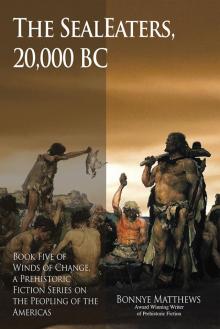 The SealEaters, 20,000 BC
The SealEaters, 20,000 BC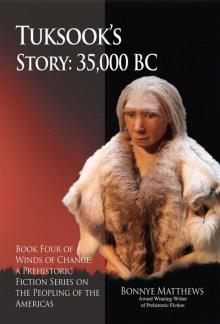 Tuksook's Story, 35,000 BC
Tuksook's Story, 35,000 BC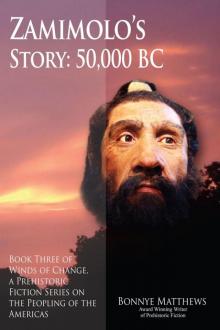 Zamimolo’s Story, 50,000 BC: Book Three of Winds of Change, a Prehistoric Fiction Series on the Peopling of the Americas (Winds of Change series 3)
Zamimolo’s Story, 50,000 BC: Book Three of Winds of Change, a Prehistoric Fiction Series on the Peopling of the Americas (Winds of Change series 3)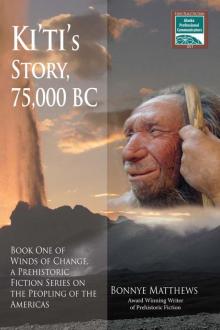 Ki'ti's Story, 75,000 BC
Ki'ti's Story, 75,000 BC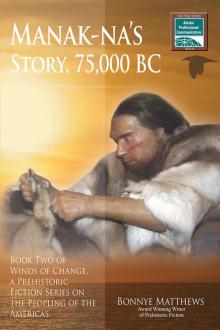 Manak-na's Story, 75,000 BC
Manak-na's Story, 75,000 BC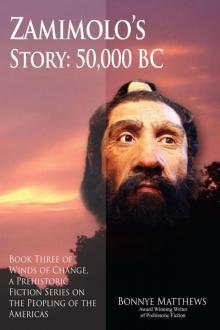 Zamimolo’s Story, 50,000 BC
Zamimolo’s Story, 50,000 BC